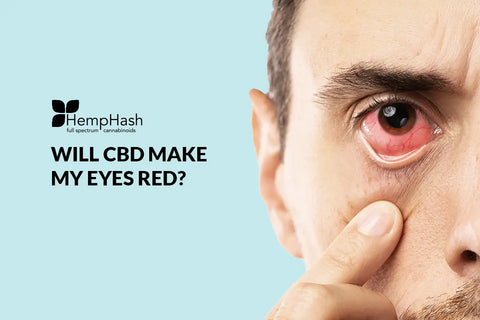One common concern for CBD users in UK is whether CBD will lead to red eyes, a well-known side effect of THC consumption. In this article, we will explore the relationship between CBD and eye redness, examining multiple factors that could influence individual responses.
A closer look at CBD and its side effects
Derived from the cannabis plant, CBD is a non-psychoactive cannabinoid that interacts with the endocannabinoid system in our bodies. Unlike marijuana with high THC content, using CBD does not produce any mind-altering effects, making it an attractive option for those seeking natural remedies for a variety of conditions. However, just like any other substance, understanding the potential side effects of CBD is crucial for ensuring safe usage.
Although studies on CBD are still relatively limited, the existing research suggests that it is generally safe and well-tolerated by most people. Some of the reported side effects include drowsiness, low blood pressure, lightheadedness, and dry mouth. Eye redness is often absent from the list of reported side effects. This lack of mention indicates that CBD-induced red eyes might not be as prevalent as some people believe it to be.
Marijuana vs. CBD: The difference in their compounds
THC (tetrahydrocannabinol) and CBD are known as the two most abundant cannabinoids found in cannabis plants. While often confused for one another, these compounds have distinct differences in their chemical structures, resulting in varying effects and uses. THC is the primary psychoactive constituent of cannabis, responsible for the characteristic "high" users experience. Unlike CBD, THC consumption has been widely associated with red eyes.
Examining the link between THC and eye redness
THC is known to lower intraocular pressure (IOP levels) in the body. This reduction in pressure dilates blood vessels, causing increased blood flow within the vessels—including those found in the eyes. As a result, visible blood vessels become more pronounced, leading to eye redness. Furthermore, THC consumption may lead to dehydration, which can exacerbate dryness in the mouth and eyes as well as cause blood vessels to dilate.
Given these findings, it is clear that THC plays a role in inducing red eyes. The question then becomes whether CBD shares similar properties or has any impact on this side effect.
Does CBD have the same effect on IOP levels and blood pressure?
In contrast to THC, CBD does not have the same impact on IOP levels and blood pressure. Research suggests that CBD might actually interfere with the effects of THC by counteracting its ability to lower IOP levels. A study conducted on mice demonstrated that while THC significantly reduced IOP levels, concurrent administration of CBD prevented this decrease.
As for blood pressure, some studies have found that CBD might slightly reduce it. With regard to red eyes, however, this minimal lowering in blood pressure is unlikely to cause significant blood vessel dilation and subsequent eye redness.
Focusing on individual responses and factors
Dosage and method of consumption
Since each person's endocannabinoid system is unique, individual responses to CBD will vary. Factors such as dosage and one's method of consumption can influence the effects and side effects experienced. For instance, ingesting cannabinoid-infused edibles is more likely to cause red eyes compared to using CBD topicals or CBD oils. This is because the former method has a higher chance of interacting with THC.
THC content
The presence of THC in some CBD products might also play a role in eye redness. Although there should be virtually no THC in CBD oil (less than 0.3% to be considered legal), certain manufacturing processes and poor-quality control could result in trace amounts present. As such, users might still experience some irritation and redness from these low levels of THC.
Smoking or vaping CBD
An alternative reason for red eyes when consuming CBD could be due to smoking or vaping CBD flower. The process of smoking or inhaling any substance may irritate the eyes, leading to redness. In this case, it is not necessarily the CBD itself causing eye redness but rather the method of consumption.
To sum it up: Does CBD cause red eyes?
In general, based on current research and anecdotal evidence, CBD seems unlikely to directly cause eye redness. Factors like IOP levels, blood pressure, and dilated blood vessels don't appear to be affected by CBD in the same way as they are by THC. However, variables such as dosage, method of consumption, potential presence of THC, and individual responses can still contribute to this effect.
The best course of action for those who want to avoid red eyes while using CBD is to choose high-quality CBD products with minimal or no THC content, consider their method of consumption, and stay hydrated to counteract potential dehydration. By taking these precautions, users can minimize the risk of experiencing red eyes from CBD use.



